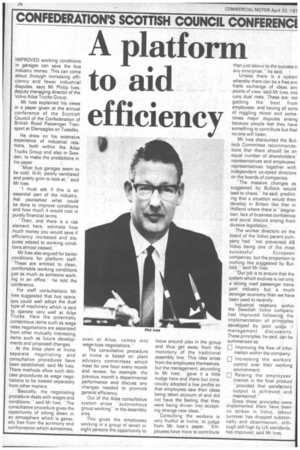A platform to aid efficiene
Page 28

If you've noticed an error in this article please click here to report it so we can fix it.
IMPROVED working conditions in garages can save the bus industry money. This can come about through increasing efficiency and fewer industrial disputes, says Mr Philip Ives, deputy managing director of the Volvo AiIse Trucks Group.
Mr Ives explained his views in a paper given at the annual conference of the Scottish Council of the Confederation of British Road Passenger Transport at Gleneagles on Tuesday.
He drew on his extensive. experience of industrial relations, both within the Ailsa Trucks Group and also in Sweden, to make the predictions in his paper.
"Most bus garages seem to be cold, ill-lit, poorly ventilated and pretty grim to look at," said Mr Ives.
"'I must ask if this is an essential part of the industry. Ask yourselves what could be done to improve conditions and how much it would cost in purely financial terms.
"Then, and there is a risk element here, estimate how much money you would save if efficiency increased and disputes related to working conditions almost -ceased."
Mr Ives also argued for better conditions for platform staff. "These are entitled to clean, comfortable working conditions just as much as someone working in an office," he told the conference.
For staff consultations Mr Ives suggested that bus operators could well adopt the dual type of machinery which is said to operate very well at AiIse Trucks. Here the potentially contentious items such as wage rates negotiations are separated from other mutually interesting items such as future developments and proposed changes.
At the AiIse plant at Irvine separate negotiating and consultative procedures have been established, said Mr Ives. There methods allow such delicate procedures as wage negotiations to be treated separately from other matters.
"'Basically, the negotiating procedure deals with wages and conditions," said Mr Ives. "The consultative procedure gives the opportunity of sitting down in an atmosphere which is generally free from the acrimony and confrontation which sometimes, even at AiIse, comes into wage-type negotiations."
The consultative procedure at Irvine is based on plant advisory committees which meet for one hour every month and review, for example, the previous month's departmental performance and discuss any changes needed to promote general efficiency.
Out of the AiIse consultative system arose "autonomous group working" in the assembly area.
This gives the employees working in a group of seven or eight persons the opportunity to move around jobs in the group and thus get away from the monotony of the traditional assembly line. This idea arose from the employees themselves, but the management, according to Mr Ives, "gave it a little nudge here and there but consciously adopted a low profile so that employees saw their ideas being taken account of and did not have the feeling that they were being driven into accepting strange new ideas.'" Consulting the workers is very fruitful at Irvine, to judge from Mr Ives's paper. "Employees have more to contribute than just labour to the success o any enterprise," he said.
Unless there is a systerr whereby there can be a free anc frank exchange of ideas anc points of view, said Mr Ives, one runs dual risks. These are: ho1 getting the best from employees; and having all sorts of niggling minor and some times major disputes arising because people feel they have something to contribute but that no one will listen.
Mr Ives discounted the BuFlock Committee recommenda tions that there should be an equal number of shareholders' representatives and employees' representatives together with independent co-opted directors on the boards of companies.
"The massive changes as suggested by Bullock would lead to chaos," he said, predict ing that a situation would then develop in Britain like that in Holland where there is "'stagnation, lack of business confidence and social discord arising from divisive legislation."
The worker directors on the board of the Volvo parent com pany had "not prevented AB Volvo. being one of the most successful European companies, but the proportion is nothing like suggested by Bullock," said Mr Ives.
"Our job is to ensure that the system which evolves is not only a strong road passenger transport industry but a much stronger economy than we have been used to recently.
Industrial relations within the .Swedish Volvo company had improved following the
implementation of principles. developed by joint union /
management discussions. These principles, he said, can be summarised as: E Improving the flow of information within the company; • Increasing the workers' control over their working environment; • Raising the employees' interest in the final product "provided that satisfactory output is achieved and maintained."
Since these principles were implemented there have been no strikes in Volvo, labour turnover has dropped substantially and absenteeism. although still high by UK standards, has improved, said Mr Ives.




















































































